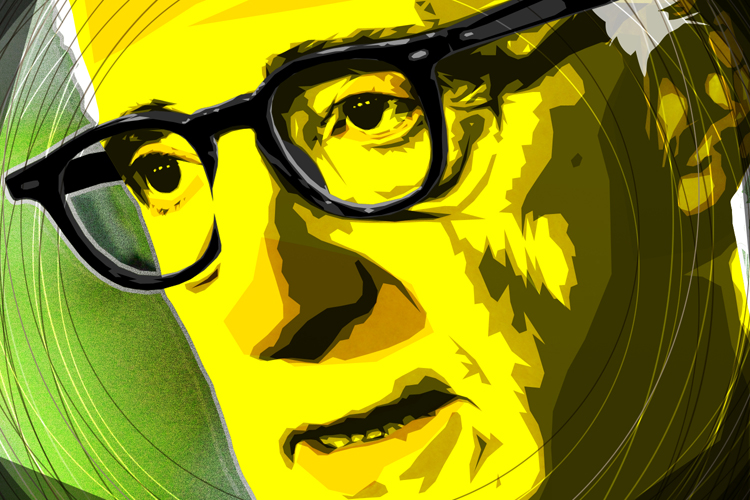I’m sick of hearing, thinking and talking about Woody Allen. Nonetheless, the allegations against him continue to capture our national attention because so much of the story is strange and sordid. These are the lives of celebrities and their children, so we feel perfectly entitled to sort through details and offer up our own pieces of evidence, court transcripts, interviews, rumors and so on, as if we are playing a national game of Clue.
For many people, this week has been difficult and triggering. Something about this case is reaching people somewhere deep, probably because we identify, so strongly, with one party or another. We are earnest. We are righteous.
Dylan Farrow wrote her letter (and Nicholas Kristof used his New York Times column) to share her testimony with a broad audience. It stands to reason that Woody Allen would have some kind of response and that the New York Times would feel obligated to publish that response.
Despite where I stand, I do recognize that Woody Allen was trapped between a rock and a hard place when it came to how, if at all, he should respond. But his own letter, published by the Times on Friday, is erratic and desperately ill advised, no matter how you feel about this situation.
At no point in the letter does Allen demonstrate genuine concern for Dylan. There is a telling callousness in the way he chooses to defend himself, offering up various self-serving pieces of evidence, many of which have been convincingly rebutted elsewhere. It’s hard not to think, “This makes him look even worse.” Though Allen is purportedly declaring his innocence, he takes exquisite care in making his feelings about Mia Farrow clear. The acrimony between the ex-lovers has clearly not tempered with time.
Allen’s desire to speak in his own defense is understandable. And there was no right way to respond, because the situation is so fraught. There were, however, less vindictive, less narcissistic ways of responding. There were ways of responding that might take Dylan Farrow’s feelings into account, and that might respect her emotional well-being.
But in truth, I don’t have the energy to pore through Allen’s letter, line by line, pointing out everything that is troubling, petty, or downright sleazy. Plenty of people will be doing that, and how.
I have realized, though, that we’re avoiding a more difficult conversation by focusing so intently on the sensational details of this Woody Allen travesty. When the dust settles, we are going to have to consider the choices we are willing to make when we learn just how human those we admire actually are.
How do we respond when we learn that someone capable of creating great art is also capable of wrongdoing? There has been talk of boycotting Woody Allen, of no longer contributing to any financial success or critical acclaim he might reap from his work. Is a boycott enough of a stand? What else might be required of us? And Woody Allen is but one man. Now that the court of public opinion has addressed Woody Allen, we must, I suppose, excavate the misdeeds of every artist who has captured our imagination.
Writing for the Times of London, David Aaronovitch notes that, “Caravaggio was a predatory pederast.” He also tells us Carl Orff was a Nazi. Wagner was anti-Semitic. If we look too closely at many historical figures, we won’t like what we see. At Gawker, Tom Scocca pointedly reminded us that Bill Cosby was accused of multiple counts of sexual assault less than a decade ago. As I read Scocca’s piece, I had no recollection of these accusations. I was somewhat mortified. Did I will myself to forget? How do I reconcile what “The Cosby Show” meant to me growing up with this painful reality that Cosby is an alleged criminal who has the audacity to offer correctives to the black community while expecting his audience to look the other way where accusations against him are concerned?
There are no easy or comfortable answers here. We mean well, but many of us let ourselves off the hook when it is inconvenient to do otherwise. I cannot offer a definitive set of guidelines for what kinds of bad behavior or criminality are acceptable in our artists and what kinds are not. I can demand more of myself, though. I can consider not only great art, but the context in which that art has been created. I can consider the people who paid a price for that art to be created and whether or not I want to appreciate that art on their backs. I can try to make better choices in the future.
Lately, we’ve been referring to to our social-media-saturated era as “the age of outrage.” I think what’s going on is more complex than that. We don’t get to hide from the truth anymore. We don’t get to hide from the possibility of multiple truths. This is the age of knowing, of Pandora’s box blown wide open. This is the age of being unable, or unwilling, or having fewer opportunities to look away. This is the age of being confronted with what we are willing to do in the name of what we believe.

